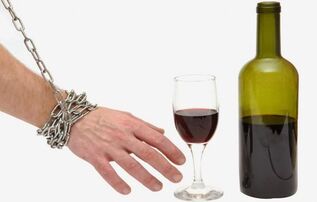
Alcohol addiction is a serious disease that suppresses the will and disturbs the human psyche. Therefore, drunkards should be treated as sick people and nothing more. It is necessary to remember that stopping the alcoholic with scandals, persuasions and tantrums will not work. This can only be done at the cost of great effort and self-control. When acting, the wife should be prepared for a tough fight, as it is not easy to get the husband to stop drinking
When it comes to female alcoholism, the situation is even worse. Husbands, children, relatives of alcoholics must understand that it is much more difficult to persuade a woman than a man. As a general rule, the addict categorically denies having a problem, she considers herself perfectly healthy and does not want to change anything. The treatment seems useless and she considers all the persuasion and advice of her family members to be a personal insult.
Important! This article will discuss how to get a person to stop drinking without going to court or the psychiatric hospital. If a drunkard has signs of mental disorders or poses a threat to others, it is necessary to seek outside help as soon as possible.
How to talk to an alcoholic
It is very difficult to force an alcoholic to turn to specialists, ordinary conversations or demands for an ultimatum cannot be addressed here. You must choose a certain form of conversation, gain stamina and patience. For this, narcologist-psychotherapists recommend following certain recommendations.

Wait for the "X" hour. It is useless to talk about treatment with a drunk person, because in this state he is very satisfied with her life and does not see real problems. In the morning after drinking, you should also not start a similar conversation, because in a hangover state, the alcoholic will agree to all arguments and promise everything you want to hear from him.
The tone of the conversation is also important. The main thing is to reject the accusations and reproaches, which will only aggravate the situation and unconsciously turn the patient against him. Do not raise your voice, it is better to speak calmly, because alcohol seriously disrupts the structures of the nervous system, so a conversation can easily turn into another scandal or, worse, physical violence from a drinker.
How to Influence an Alcoholic
Convincing a drunkard that alcoholism is a problem not only for him, but also for the environment is not easy. To do this, the drunkard's family members will need to be patient, persevere, and also find an approach to discovering how to get a loved one treated for alcoholism.
It is impossible to persuade an alcoholic who is elated and satisfied with such a lifestyle to stop drinking quickly. An educational conversation is not appropriate during a hangover syndrome. In such a state, the patient will not pay attention to persuasion, although he will make several promises to end the conversation as soon as possible and take a sparing dose of alcohol.
It is best to start a conversation when a drunkard is faced with the negative consequences of "intoxicating" drinks. It could be:
- impregnated salary;
- wrecked car;
- dismissal from work;
- family problems.
You cannot succeed with accusations and reproaches. Therefore, putting a drinking person on the path of correction will not work, even if they really want to. To get the drunk to pay attention to persuasion, we post some tips:

- Talk to an alcoholic calmly, without raising your tone. Screaming is undesirable, since such actions on the part of loved ones can provoke an unpleasant reaction in the drunkard. This is explained by the fact that alcoholics have an unstable nervous system, and this is fraught with scandals or beatings;
- When talking to an addict, it is necessary to behave confidently and firmly that he is right. This will allow the opponent to understand the seriousness of the situation and the firmness of the interlocutor's opinion;
- there is no need to cry and press with pity for a life that didn't work out due to the guilt of an alcoholic. These actions will not bring positive results either;
- no need to pressure the patient with empty threats. If you promise to do something if the drunkenness continues, you should definitely follow through on the ultimatum.
If one of the spouses drinks?
The tense situation in the family due to alcohol abuse by one of the spouses is not a reason for their forced release from addiction.
This is prohibited by law and can cause significant harm to the health of an alcoholic, especially if, without his or her consent and prior consultation with a doctor, toxic disulfiram-based medications are added to food.
Wives or mothers of drunkards should not repeat the most common mistakes of women:
- First of all, you must realize that a drunk cannot be trusted. His 100th promise to part ways with alcohol is a myth.
- It is impossible to threaten in an empty way, if your words are not backed by action, it is better not to pronounce them. They convince the alcoholic of impunity.
- It is unacceptable to offend a spouse, it is necessary to be able to awaken in him a feeling of guilt about his next irrational trick (loss of money, late return home).
- Instead of unrealistic threats, it can provoke fear of imminent death in a drunkard, pointing out the symptoms of his health, characteristic of the possible development of cirrhosis or cancer.
- It is necessary to stop protecting the drunk from the censorship of others, which will undoubtedly cause him shame and feelings of remorse.
- It is necessary to restrict the drinker's access to family money, without giving a penny for alcohol.
- Find out the reason for drunkenness, especially when it comes to a woman. Without removing the trigger for addiction, you cannot get rid of it.
Motivation for a sober lifestyle
Hoping to save a family can convince an alcoholic to stop drinking.
To motivate an alcoholic to fight against the green snake, it is necessary to convey all the benefits of a sober life, what benefits await him after giving up alcohol. There are different motivations.
You can focus on the well-being of the family, because alcohol abuse almost always leads to the destruction of the family. The hope of saving the family can convince the alcoholic to stop drinking. Until the dependence on alcohol has reached a neglected degree, it is necessary to try to convey to the patient the need for treatment.

You can try talking about the drinker's health. Explain that you are seriously concerned that you have noticed how bad his health has become. Without reproaches or oaths, it is necessary to explain that stomach and blood pressure problems, heart disorders - all this arose as a result of the abuse of alcoholic beverages.
If a person previously aspired to work and loved it, he can try pushing this factor. Drinkers always have problems with work, from simple dismissal to dismissal under the "alcoholic" article. If this happens, it is almost impossible for a person to find a normal job. Remind yourself gently of what your spouse dreamed of when he was not drinking, how you planned his career.
If there is no specific motivation, it is almost impossible to get an alcoholic treated. An addicted person must understand why he needs to get rid of the addiction and what privileges it will give him. He must consciously want to quit smoking for something important and not do it on a family whim.
Health
When speaking to an alcoholic husband, you should try to convey the opinion that he is concerned about her deteriorating health. It is important to calmly explain that during the drunken time, the alcoholic showed negative changes in appearance:
- cyanosis of the face,
- swelling,
- beer belly;
- insomnia.
Alcoholics are also informed about changes in character and behavior. You can compare the state of health of a drunkard at the time of a healthy lifestyle with the current state. Try with the patient to evaluate the changes that have occurred and convince him of the usefulness of treating the disease.
Alcoholism is a destructive tool in family relationships, often leading to divorce. Until a drunkard or alcoholic has acquired an advanced pathology, there is a possibility of saving the family. Try to convince the drinker of the need for treatment if the drunkard stops performing seminal duties:
- passive in relation to the spouse;
- is not interested in children;
- does not care about the material welfare of the family;
- is aggressive.
Try to convince the patient that he is loved by the family. The main thing in this matter is to calmly, without reproach, convey the idea of the need for treatment.
Finding a new job in such a situation is not easy. Even if this is successful, the job will be poorly paid and unskilled. To help a person who drinks in this case, it is necessary to convince him to change his lifestyle, to give him reasons for how much his life has changed for the worse since the beginning of alcohol abuse. Without motivation, it is not easy to convince a drunk to seek treatment. It is important for the drinker to understand that this is exactly what he needs.
Can a person stop drinking on their own?
We would like to warn you: self-treatment of alcoholics is rarely effective. Sometimes, with the help of character and will, this is possible if alcohol dependence has not reached the physical stage. The basis for quitting an addiction is the desire to save a family, get a job, a status in society, another goal, the achievement of which will be a reward for the effort made. As an aid to you, it is worth starting to practice proper nutrition, jogging and weekly bath procedures.
To combat alcoholism, popular and medicinal treatment methods are widely used. Both options have pros and cons. They are often practiced when it is impossible to convince a drinker, husband or child of the harmfulness of the habit. There are pharmacological and home remedies that cause an extreme aversion to alcohol. They are harmless, they do not cause addiction or rejection of the body. They contain substances that are completely incompatible with alcohol. They are added to the drink or food of the person who drinks.
After ingesting alcoholic beverages, they cause an unpleasant reaction in the body: vomiting, nausea, dizziness, etc. The most common home remedies are:
- thyme broth;
- mutton broth;
- Decoction of St. John's wort.
An interesting covert persuasion method to stop drinking has existed in ancient times: the manure fungus. The fungus contains a substance that stops the conversion of ethyl alcohol to acetaldehyde. If you eat a mushroom and then drink alcohol, then a person will have symptoms of severe poisoning. Our grandmothers in this way imperceptibly weaned their husbands from alcohol. But in modern realities, it is better not to use such a method, especially since medicine has advanced so much.
How to get an alcoholic to heal: the right motivation
To convince an alcoholic to be treated, communication tactics should be developed:
- Stop feeling sorry for the drinker and covering up for him. The alcoholic should not be expected to stop drinking. This problem-solving babysitting approach is beneficial to the alcoholic, as a result, he will not stop drinking, but will get rid of everyday problems;
- you can't constantly create trouble with a drunk, lest you push him into a cheerful lifestyle. It should be understood that hysteria and unnecessary discussions about the use of alcohol will aggravate the problem, since after the next scandal the drunkard will try even harder for the bottle;
- when dealing with a dependent person, observe calm and equanimity. In moments of enlightenment, the alcoholic speaks of healing from a bad habit and of rehabilitation. You are allowed to call a narcologist at home;
- You need to support the desire for sobriety of the person who drinks, demonstrate the joys of healing, try to find hobbies for him, new goals in life.
Only some cases can be an exception in this order:
- the patient is dangerous for himself and for others;
- the alcoholic has lost the ability to care for himself;
- the drunkard's mental state is serious, without medical intervention he will die.
Many people are interested in the question of whether it is really possible to save a loved one from addiction. After the mandatory hospitalization of the patient, measures are taken to block a fever attack, after which the patient is discharged from the hospital and sent to his home. Practice shows that the patient, even after the serious consequences of drinking, will revert to the old.

It is worth noting that it is impossible to secretly cure a sick alcoholic. Often people close to the patient resort to the help of healers, psychics and other unconventional methods. Any means and action for the recovery of an alcoholic without her consent is not only useless, but also deadly.
In addition, the doctor will perform an examination. Developing a strategy for the holistic healing of the patient will allow you to move with determination toward the goal. It will not be possible to cure a drunkard in a single session or medical manipulation. In this matter, it is required, in the first place, to establish the reason that caused the impetus to the abuse of alcohol.
How do you have to behave properly with an alcoholic to accept therapy?
If a person denies her addiction to the "green snake", she needs to be convinced otherwise. How to persuade an alcoholic to be treated in such a way that he clearly understands the existing problem? To do this, you need to talk seriously with him and the conversation should take place with a sober person. What you should pay attention to:
- People who drink often have memory problems. Unpleasant incidents in life that you forgot are worth remembering.
- The desire to take a sip in an alcoholic comes up quite often and for no reason. You need to explain that for ordinary people, problems at work or at home will not cause a binge.
- It is worth finding out what feelings an alcoholic has in a sober head. Frustration and emptiness are some of the characteristics of addiction. You need to be clearly aware of this.
- Alcohol addicts lose control and often do not know the norm. Because of this, a person binges regularly.
The conversation must take place once. It is advisable to do this when the alcoholic is in the mood for a conversation. For example, the day before he screwed up something and was guilty. Every argument must be made with great confidence. You cannot speak out loud, press compassionately, resort to threats.
The alcoholic often behaves inappropriately during periods of intoxication. Furthermore, these cases are completely forgotten and "erased" from memory. To make him look sideways right now, video evidence can be filmed. The drinker will not like what he saw, he must draw conclusions and accept the treatment.
How to behave to tune a drunkard to treatment:
- do not issue threats that you cannot deliver;
- hint at how bad your loved one behaves when drunk;
- always shows confidence in their ability to stop drinking;
- let us understand to a loved one that the disease is to blame for everything, that it can and should be fought;
- don't address the alcoholic's drinking problem.
Tell us how hard it is to see someone drunk, how unpleasant it is to hear strangers tell the antics of an alcoholic. You must realize that those close to you suffer from your addiction.
Problems derived from drunkenness must be corrected by the alcoholic himself. The payment of debts made during a drunkenness, reconciliation with relatives, confrontations with the boss - all this is decided by the culprit.
You can create any good reason to quit. Family happiness is a strong argument to start treatment.
Recently, many experts have come to the conclusion that alcoholism is a disease. How to justify this statement and convince to start treatment:

- Diagnosis. Any ailment has symptoms, including alcoholism. It is expressed in an irresistible desire for alcohol, changes in behavior, denial of the desire for strong drinks.
- Chemical addiction. Thanks to her, a person begins to abuse alcohol. We all have problems in the family and at work, but only dependent people get drunk because of it.
- Progression of the disease. The development of alcoholism follows a predictable scenario. In the end, a person finally degrades.
- Alcoholism is a chronic disease. Therefore, a person who has not consumed alcohol for years breaks down with a glass of vodka.
- The consequence is death. If treatment is not started in time, the patient will die before the prescribed time. The cause is usually concomitant diseases: cirrhosis, heart attack, cardiomyopathy and other ailments.
Treating alcoholism takes a long time. You must be patient and not give up under any circumstances. Some settle for coding, which helps many addicts. The main thing is that a person understands a simple truth: he is absolutely prohibited from drinking alcoholic beverages. It is an addiction that returns even after a few grams of alcohol. Therefore, for such people, sobriety should become the norm.
How to find the cause of alcoholism
Treatment of alcohol addiction will be meaningless in 2 cases: if a person is satisfied with everything and wants to drink more, or if they have a good reason to seek comfort in alcoholic beverages. If the provoking factor is removed, it will be much easier to cure an alcoholic. You may stop drinking without coding.
Often times, the causes of chronic drunkenness are quite obvious, so they can be identified without much difficulty. As a general rule, the alcoholic himself calls them in the course of a confidential conversation. If he cannot ask you about his account, he can do so with the help of a psychologist. The specialist will find out why a person is not satisfied with his life and will give him the necessary advice.

The most common causes of alcoholism:
- boring, uninteresting work or excess free time;
- constant alcohol use with friends, relatives or colleagues, gradually leading to alcohol dependence;
- unstable personal life, family disputes, recent breakdown of relationships, betrayal or loss of a loved one;
- lack of work or housing, poverty, unstable life, feeling of hopelessness;
- the presence of serious chronic or fatal diseases, the desire to relieve pain with alcohol;
- burdened heredity, predisposition to alcoholism.
Methods to help an alcoholic return to a normal life
If you were successful in persuading an alcohol addict for treatment, you should immediately carry out the next steps of the planned plan. As soon as the patient has accepted, he should go to an appointment with a narcologist so that the specialist will prescribe the necessary therapy in this situation. To exclude breakdowns, remove alcohol from the house, and also exclude possible drunken meetings with former drinking buddies.
It was soft on paper, so don't think that she will be able to get consent to treatment for her negligent alcoholic husband on the first try. This is quite a difficult task that requires a lot of patience and, somewhere, even cunning and resourcefulness of a woman. But when the result is achieved, her life will change drastically, which will be a valuable reward for her efforts.
There are a number of clinics that can forcibly hospitalize a patient by court order. The therapy process itself is divided into several stages:
- Motivational conversation with a psychologist. In some cases, this measure helps the person to become aware of the addiction and accept voluntary treatment.
- Forced hospitalization in an inpatient unit.
- Detox procedure.
- Rehabilitation (includes drug coding, psychological support, hospitalization).
- Social adaptation. Help a former alcoholic find a job, learn a new profession, counseling.
- Work with relatives. This includes explanatory conversations, participation in self-help groups, personal consultations with a psychologist.
The best solution is to take the drunk to a specialized paid clinic where mandatory treatment services are provided. The downside to this method is that keeping an alcoholic in a clinic for a long time requires large financial investments. So a day in a hospital will be expensive. The price depends on the region and the class of the hospital.
Another way is to place the patient in a psychiatric clinic. This measure is considered extreme. You can go to a psychiatric clinic only by court decision or a psychiatric team (the experts on site decide on the need for urgent hospitalization). In the latter case, the presence of a police squad is mandatory: they will register the presence of a real threat to the health of the patient or those around him.
Some believe that it is possible to vigorously treat an alcoholic at home. Various decoctions of herbs are considered especially effective: they reduce the desire for alcohol.
Here is one of the recipes. Take in equal proportions (10 g each) the following ingredients:
- Motherwort.
- Ponytail.
- Dried burdock and sorrel roots.
- Mint.
Put the herbs in an enameled bowl, pour a glass of boiling water and heat for 15 minutes in a water bath. The resulting broth is filtered and drunk in small portions throughout the day. It is not recommended to prepare a drink for future use; it should always be freshly prepared. If you want to secretly cure a person of drunkenness, you can add small portions of the infusion to alcoholic beverages.
You can also buy a prepared herbal mix. It is famous for these properties:
- discourages the desire to drink alcohol;
- increases the protective functions of the body;
- stimulates the immune system;
- helps eliminate toxins, cleanses the liver.
This drink is especially convenient because it is brewed and drunk like an ordinary herbal tea in unlimited quantities throughout the day.
If close people were able to influence an alcoholic to undergo drug treatment and psychotherapy, it is important to decide on future actions. The main task at this time is to strengthen motivation for a healthy lifestyle. Most addicted people don't see any point in being sober. Living the right way is scary because alcoholics don't know what to do next and how to enjoy life. To help such a person, those close to him should:
- to be convinced that an alcoholic is a weak-willed egoist, a childish person. Satisfying the drunkard's wishes just to prevent him from drinking again is the wrong way to go. It is required to allow the patient to make decisions for himself, then he can enjoy such action;
- maintain the positive aspects of a sober life, persuade the patient to write them down as daily motivational support;
- save the patient from the usual social circle, for which it is better to move to a new place of residence;
- keep the ex-alcoholic interested in a new hobby, don't let him have free time to reflect on a boring existence. To do this, change jobs, take it up with a hobby, sport.
Be consistent with your own campaigns and views.
- Show examples of important people in alcoholic society who have given up this addiction.
- Go together for a consultation with a psychotherapist and a narcologist.
- Adjust your personal position in family life to sacrifice or control too much to the contrary.
Remember that only a well-built motivation of the addict for treatment and a sober lifestyle will help to persuade the patient of compulsory treatment.
























